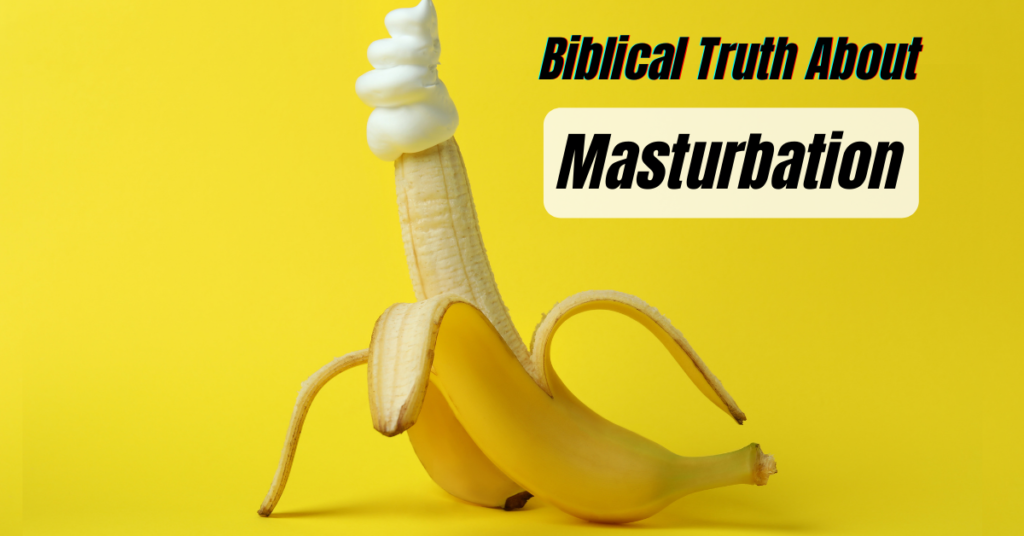
Is masturbation a sin? This is a question that often provokes heated debates and evokes strong emotions and diverse opinions among religions, churchgoers, pastors, priests, and people of all ages for centuries. This question has puzzled many, causing a whirlwind of moral, ethical, and spiritual discussions.
As someone who has spent over half a decade studying the Bible, pastoring churches, and repeatedly delving into the sacred texts from Genesis to Revelation, I am well-equipped to explore this intricate issue.
In this article, we will navigate through historical, ethical, psychological, and biblical perspectives, aiming to provide a well-rounded answer to this age-old question.
By the end, you’ll have a clear understanding, backed by biblical references, to confidently address that big interrogation which always causes confusion among Christians of all denominations. Is masturbation a sin indeed?

Masturbation is the self-stimulation of the genitals for sexual pleasure, often leading to orgasm. This act can be performed manually or with the aid of objects or devices. It is a common sexual behavior found across different cultures and age groups.
While generally considered a normal part of human sexuality, masturbation has been the subject of various cultural, religious, and ethical debates throughout history.
For some, masturbation is a way to explore their bodies and understand their sexual responses. For others, it might serve as a method for stress relief or to help with sleep.
Despite its prevalence, the perceptions and attitudes toward masturbation can vary widely based on personal, cultural, and religious beliefs.
In this article, we will explore these varying perspectives, particularly focusing on the question: Is masturbation a sin?
Is masturbation a sin? This question has been debated for centuries, reflecting the shifting attitudes towards sexuality. Historically, masturbation was often condemned, especially in religious contexts.
In the Middle Ages, for instance, sexual morality was tightly controlled by religious authorities.
A notable example is Pope Leo IX, who, in 1054, endorsed Saint Peter Damian’s “Book of Gomorrah.” This book condemned masturbation alongside other sexual sins, underscoring the era’s strict moral discipline.
Religious Perspective
When exploring the question, “Is masturbation a sin?” within Christianity, the views can be quite diverse.
In 1054, Pope Leo IX unequivocally condemned masturbation, labelling it a serious sin. This traditional stance was rigorously upheld by the Catholic Church for centuries (Catholic Education Resource Center).
In contrast, contemporary leaders like Pope Francis offer a more nuanced perspective. While he adheres to traditional teachings that classify masturbation as a sin, Pope Francis also emphasizes the importance of context.
He acknowledges factors such as emotional immaturity or psychological issues, which can mitigate moral culpability. Click here
This highlights a shift towards a more compassionate approach, yet the core question remains: is masturbation a sin?
Judaism presents a similar diversity of opinion regarding the question, “Is masturbation a sin?” Traditional Jewish law, derived from interpretations of the Torah and Talmud, generally views masturbation as prohibited.

The Talmud, particularly in Niddah 13a, condemns the act of wasting seed, aligning with a strict interpretation that forbids masturbation (sefaria.org).
However, modern Jewish scholars and communities show varying interpretations. Some contemporary views recognize the complexity of human sexuality and the potential psychological benefits of masturbation in certain contexts.
This diversity within Judaism reflects a broader trend of balancing ancient teachings with contemporary understanding (Quora).
When approaching the question “Is masturbation a sin?” from an ethical standpoint, several key factors must be considered. Ethics, fundamental concerns, what is right and wrong in human behavior, often emphasizing intent, consequences, and social norms.
1. Personal Intent: One ethical consideration is the intention behind the act. In most cases, masturbation is often used as a means to understand one’s body, relieve stress, or manage sexual tension without harmful intent. On that aspect, we can all agree it is ethically permissible.
2. Self-Respect and Consent: Here we go in the US, statistics show that every 68 seconds someone is forced to have sex without their consent.
Since masturbation involves only oneself, issues of consent are inherently satisfied. I think that is something people should clap for. However, we also agree, the act should still respect one’s dignity and self-worth.
1. Health Benefits: Ethically, actions that promote personal well-being and do not harm others can be considered permissible.
Many studies have shown that masturbation has several health benefits, such as stress relief, improved sleep, and better sexual health, which could support the argument that it is ethically acceptable.
2. Potential Harm: Interestingly, the beliefs surrounding the harms of masturbation have influenced some everyday products we use today. Two notable figures who spent their entire lives speaking against masturbation were Dr. John Harvey Kellogg and Reverend Sylvester Graham.
But we live long enough to understand today it wasn’t a question of faith, it was just a marketing strategy, using the naivety of believers at the time to build their brand and also their fortune.
Give to Caesar what belongs to Caesar. We cannot talk about ethics and morality related to masturbation without referring to Dr. John Harvey Kellogg and Rev. Sylvester Graham.
These two emblematic figures of the 7th Day Adventist Church in the 19th and 20th centuries played significant roles in shaping the cultural and religious views on masturbation.
1. Dr. John Harvey Kellogg, The Founder Of Corn Flakes: Dr. John Harvey Kellogg was a staunch advocate against masturbation, believing it led to various health issues, both physical and mental.
As a prominent physician and health reformer, he promoted a healthy and bland diet to curb sexual urges and believed that could reduce the temptation to masturbate. To this end, he developed corn flakes as a food thought to mitigate sexual desire.
Kellogg’s beliefs were rooted in his religious and moral convictions. He was a key figure in the 7th Day Adventist Church and believed that maintaining a healthy diet could help manage sexual impulses.

2. Rev. Sylvester Graham, The Founder Of Graham Crackers: Rev. Sylvester Graham, a Presbyterian minister and dietary reformer, shared similar concerns about the effects of masturbation.
He believed that a vegetarian diet and the consumption of whole grains, epitomized by the creation of graham crackers, would help curb sexual desires and promote a healthier, more virtuous lifestyle.
Graham’s advocacy for dietary reform was intertwined with his religious and moral convictions, emphasizing the importance of self-control and purity.

So, about Dr. Kellogg and Rev. Graham’s claims – seem like they were just making things up, right? No Bible references, no scientific backup, no serious studies, nothing! They were basically saying, “Trust us, we’ve got this all figured out.” But let’s be real, it was all about pushing their moral and religious beliefs.
The problem with morality and religion? They change faster than fashion trends. Some folks even think Kellogg and Graham were just clever businessmen, using their “healthy living” talk to build their brands and make a fortune.
Picture this: Dr. Kellogg and Reverend Graham sitting in their nice offices, twirling their moustaches, and laughing as they count their cereal money. “Haha, they totally fell for our ‘pure living’ idea!”
But seriously, maybe they really believed in what they were selling. Or maybe they were just a couple of lucky guessers. Either way, their legacy lives on every time we pour a bowl of corn flakes or munch on a graham cracker.
Talk about leaving a lasting mark! In the end, while their crusade against masturbation might have lacked scientific proof, it certainly didn’t lack creativity. And hey, we got some pretty tasty snacks out of it.
Beyond the moral and ethical debates, there’s solid scientific evidence suggesting that masturbation can be quite beneficial for your health.
One of the most compelling health benefits of masturbation is its potential to reduce the risk of prostate cancer. Several studies have highlighted this benefit.
For instance, a study published in the journal *European Urology* found that men who ejaculated frequently (at least 21 times a month) had a lower risk of developing prostate cancer compared to those who ejaculated less frequently.
The study suggests that regular ejaculation may help flush out potential carcinogens from the prostate (Harvard Medical School).
Masturbation is also known for its stress-relieving properties. Engaging in masturbation can trigger the release of endorphins, which are natural mood boosters.
These chemicals help reduce stress and promote a sense of well-being. In a world where stress is a common part of daily life, finding healthy ways to manage it is crucial.
Additionally, masturbation can improve sleep quality. The act can help release tension and promote relaxation, making it easier to fall asleep.
According to Manual Men Health care , the release of neurochemicals like oxytocin and prolactin during orgasm can contribute to better sleep, which is essential for overall mental health.
From a psychological perspective, masturbation is a way to explore your own body and understand your sexual responses. This self-exploration can lead to better sexual health and more fulfilling sexual relationships.
In fact deliberate masturbation is one of the best technique which can help you with premature ejaculation. To learn more about it ,read this article .
Knowing what feels good and how your body responds can improve communication with your partner and enhance mutual satisfaction.
Leaving aside all rumors, personal thoughts, and beliefs, let’s answer the question:
“Is masturbation a sin?” according to the teachings of the Holy Scriptures. It’s important to note that while the Bible addresses many things, it doesn’t cover everything in explicit detail.
The fact that masturbation is not directly mentioned in the Bible leaves room for speculation, false teachings, and the imposition of personal opinions. This is indeed unfortunate as it can lead to confusion among believers.
The two closest chapters in the Bible that have been interpreted to address masturbation are Genesis 38:1-10 and Leviticus 15:16-18.
However, these passages are often taken out of context by focusing on one specific action while ignoring the broader narrative and intent.

Is masturbation a sin? To understand why some preachers always refer to the Onan story to provide a positive answer to that question, we need to understand the background. Let’s dive in.
Judah, one of the twelve sons of Jacob, had three sons: Er, Onan, and Shelah. The firstborn, Er, married a woman named Tamar.
According to the word of God, Er was wicked in the sight of God, and the Lord took his life. The Bible does not provide any details to say why.
According to the Levirate marriage law, it was Onan’s duty as the second born of the family to marry Tamar and produce offspring (a son) for his deceased brother.
This practice ensured the deceased brother’s lineage and provided for the widow in her old age.
In addition to the duty to provide an heir, the firstborn son in Hebrew tradition was entitled to a double portion of the inheritance. This meant Er, as the firstborn, would have received a double share of Judah’s wealth.
Onan knew that if he produced an heir for Er with Tamar, that child would inherit the double portion. If no child was born, Onan would inherit the double portion as the next eldest son.
Driven by selfish motives, Onan chose to deceive Tamar and shirk his responsibilities by ensuring she did not conceive, thus securing the double portion for himself.
Onan’s act was not just about avoiding fatherhood. It was about selfishness and deceit. He took advantage of Tamar, a widow, enjoying the benefits of their union without honoring the Levirate duty.
His actions directly disobeyed the law and were considered wicked in the eyes of the Lord. As a result, God took Onan’s life as well.
This story is often twisted to suggest that it condemns masturbation and that was why God took Onan’s life. However, the real issue here was Onan’s disobedience to the Levirate law and his deceitful treatment of Tamar.
The Bible emphasizes the importance of caring for widows and orphans, and Onan’s actions were a direct violation of this principle.
He failed to provide for Tamar and misused her for his selfish gains. This passage highlights the consequences of deceit, selfishness, and failing to uphold one’s responsibilities.
Another reason the death of Onan wasn’t about masturbation is because what Onan did doesn’t match the definition of masturbation. Masturbation by definition is self-stimulation to the point of orgasm.
Onan was having sex with someone else – Tamar – which has no relationship at all to masturbation. So, equating Onan’s actions with masturbation is like comparing apples to watermelon.
Onan’s act was about selfishness and deceit during sexual relations, not self-pleasure. The distinction is crucial and clarifies why his death was tied to his failure to fulfil his familial duty and the law, not the act of masturbation.
So, if anyone tries to use the story of Onan to condemn masturbation, you can confidently say they’re mixing up their biblical fruit!

This is one of those texts preachers often twist to claim that masturbation is a sin. But let’s be real here – this chapter is all about physical purity.
Seriously, it has nothing to do with sin. It’s all about cleanliness, especially in the context of temple worship.
The verses say that if a man has an emission of semen, he’s considered unclean until evening and needs to take a bath. The same rule applies even if it happens during sex with his wife.
So, the big question: can an object be a sinner? The answer is a resounding no because its inanimate. The Bible says both you and your clothes are unclean, not sinful.
It’s clear this passage is about maintaining physical cleanliness and the holiness of the temple, not about moral judgement. So, the only thing you need to do after masturbation is take a shower, change your clothes, and then go praise the Lord.
Remember, the keyword here is “Is masturbation a sin?” Based on this scripture, the answer leans more towards maintaining cleanliness rather than condemning the act itself.
So, if anyone tries to use Leviticus 15:16-18 to argue that masturbation is a sin, you can confidently tell them they’re missing the point. Just keep it clean, folks – literally!
So, is masturbation a sin? After diving deep into historical, ethical, psychological, and biblical perspectives, it’s clear that the answer is a resounding no.
The Bible doesn’t explicitly mention masturbation, leaving room for various interpretations.
The story of Onan in Genesis 38:1-10 is often misused to condemn masturbation, but the real issue was Onan’s disobedience and deceit, not self-pleasure.
Similarly, Leviticus 15:16-18 is about physical purity and cleanliness, not moral judgement on masturbation.
Ethically, masturbation is generally considered permissible when it promotes well-being and doesn’t harm others. It’s a common part of human sexuality, often used for self-exploration and stress relief.
Historically, figures like Dr. John Harvey Kellogg and Rev. Sylvester Graham might have had strong opinions against it, but their views were more about moral and religious beliefs – and perhaps clever marketing – than solid scientific evidence.
So, next time someone tries to argue that masturbation is a sin based on these biblical passages, you can confidently tell them they’re missing the point.
Masturbation, when understood in its proper context, is not condemned by the Bible. It’s about maintaining cleanliness and understanding personal boundaries, not about labelling the act itself as sinful.
In summary, masturbation is not a sin, vivid Christianity a very popular site said that before read the article here.
Masturbation it’s a natural, common, and generally healthy aspect of human sexuality. So, keep it clean, folks – literally and figuratively! And don’t let outdated myths and misinterpretations cloud your understanding.
Now hear me out. If masturbation leads to negative consequences like addiction, interference with daily life, or emotional distress, it could be deemed ethically problematic.
This is particularly relevant when it becomes compulsive and starts affecting relationships or personal responsibilities. We also need to avoid that, if you see yourself already in a situation like that it is important to look for help, other than that keep it going.
Join a vibrant community committed to improving overall wellness and boosting confidence in intimate moments.
© 2025 All Rights Reserved By STAMINA SOL.
2 Responses